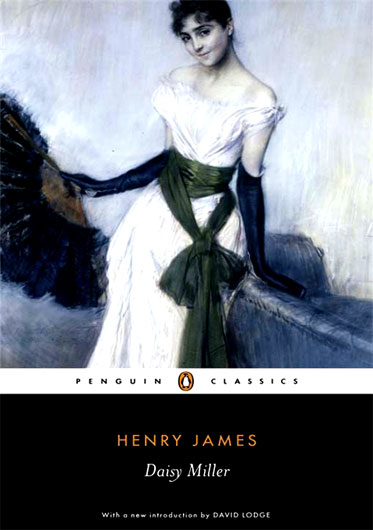Henry James: Daisy Miller
 The protagonist of Henry James's novella is Daisy Miller, a pretty, fun-lovin', silly American girl who's traveling through Europe with her mother and her brother. Daisy is a rich and elegant socialite, but she doesn't belong to the elite class per se – she's much too indiscreet and rebellious for that. For instance, she doesn't hesitate to talk to people she hasn't been formally introduced to, and she's also happy to go for solitary walks with a man who is neither a member of her family, nor her fiancé. At the beginning of the story, she gets acquainted with Winterbourne, an American man who's been living in Europe for a long time – and who is therefore no longer up-to-date as to the proper American manners. Winterbourne is immediately enchanted by Daisy's beauty and her easy-going, open personality, but he doesn't fully abandon himself to his budding passion – instead, he starts to over-analyze everything and he starts to wonder whether Daisy is indeed as innocent and nice as she seems.
The protagonist of Henry James's novella is Daisy Miller, a pretty, fun-lovin', silly American girl who's traveling through Europe with her mother and her brother. Daisy is a rich and elegant socialite, but she doesn't belong to the elite class per se – she's much too indiscreet and rebellious for that. For instance, she doesn't hesitate to talk to people she hasn't been formally introduced to, and she's also happy to go for solitary walks with a man who is neither a member of her family, nor her fiancé. At the beginning of the story, she gets acquainted with Winterbourne, an American man who's been living in Europe for a long time – and who is therefore no longer up-to-date as to the proper American manners. Winterbourne is immediately enchanted by Daisy's beauty and her easy-going, open personality, but he doesn't fully abandon himself to his budding passion – instead, he starts to over-analyze everything and he starts to wonder whether Daisy is indeed as innocent and nice as she seems.
Winterbourne keeps wondering about this question throughout the story, and even though he accidentally falls in love (?) with Daisy, he cannot come to terms with the basic impoliteness of Daisy's conduct. (Of course, he only frowns upon her behavior when she's being impolite in someone else's company – when they first meet, he's more than happy to accompany the girl on a trip to a castle nearby, after half an hour into their relationship.) So anyway, when they meet again in Rome some time later, Winterbourne merely watches with a condescending smile on his face how Daisy runs to her ruin, and he doesn't even try to understand her behavior.
When I read about supposedly unruly, I-have-it-my-own-way characters like Daisy Miller, I often wonder if their behavior can really be considered rebellious and shocking, just because they live the way they want to live, say what they want to say, and ask what they want to ask – even if this is not acceptable in their social circles. And I wonder whether being rebellious and shocking is something they consciously do. In the blurb of my copy this question is asked downright: is Daisy Miller deliberately going against the norms of the society she lives in, or is she merely unaware of the norms she's supposed to adhere to?
Well, I think neither of the above is true. Daisy Miller knows the rules she should adhere to (and sometimes it seems that she's troubled by the fact that she's shunned by society because of her lack of adherence), but it's not due to some youthful folly or defiance that she keeps breaking the rules – it's simply because for her, it's truly and utterly incomprehensible why she shouldn't spend her time with someone whose company she enjoys.
Sure, the morals and rules of the end of the 19th century were somewhat different from the rules we have now, and when I read novels dealing with similar themes in the past (I mean the theme of the clash between the American aristocracy and an independent woman – see Edith Wharton's novels), sometimes I used to think how good it is to be alive here and now, in a world much less suffocating. But now I read this novel in a different way – I didn't keep thinking about how lucky I am to live in a part of the world where presumably no-one is shunned and/or destroyed for the exact same crimes Daisy commits – because I figure that the Daisy Millers of the present also shock the others, only with different crimes. And I find this idea almost unbearably sad because a Daisy Miller never goes out of her way just so that she can shock people – she simply wants to live, innocently, harming no-one, and she does live, as long as they let her. And even though, like I said, the male protagonist's greatest dilemma is whether Daisy is innocent or not (not necessarily in the sexual sense), I felt that she is.
By the way, Henry James – contrary to me – doesn't get overly moralizing, and I don't think he tries to teach me any kind of lesson or great truth. And because of this, I prefer him to, e.g. Theodore Dreiser, even though their styles and world-views seem to be somewhat similar.
And as regards the author's style – it's often mentioned about James that deciphering the meaning of his sentences, and understanding his subtle references is a feat in itself. Well, it's quite probable that I overlooked a whole lot of the hidden references and other subtleties, but I was surprised by the fact that after the first couple of pages I had no trouble at all following his lovely, meandering, endless sentences. Translating his work must be a nightmare, but reading him in English was much less difficult than I expected.





